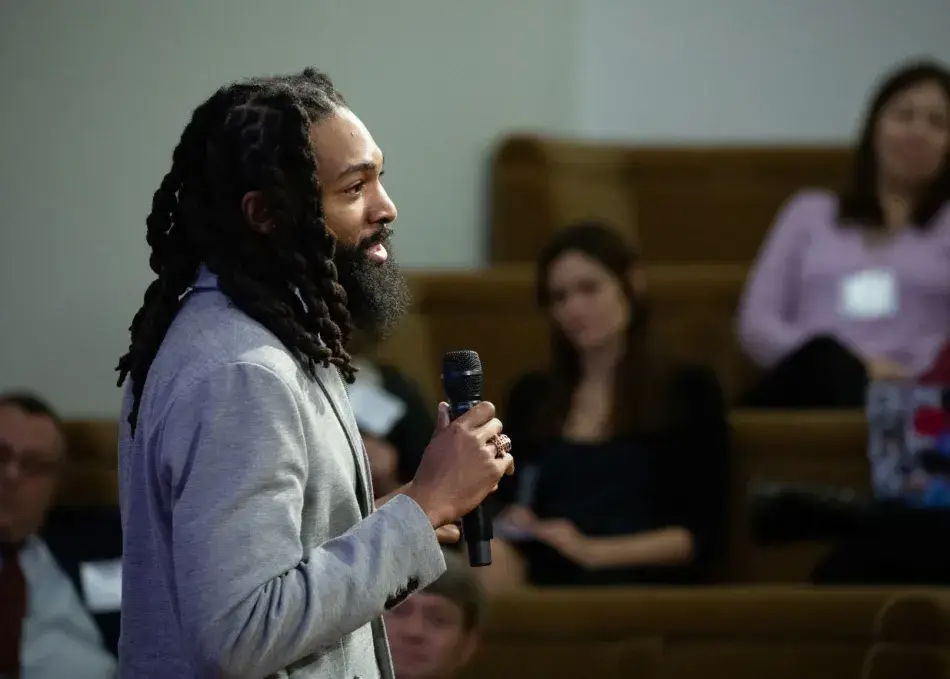
Since its founding, projects that work to bolster Americans’ engagement with government institutions have been a hallmark of the American Academy of Arts and Sciences. Our charter states that the “end and design” of the American Academy is to “cultivate every art and science which may tend to advance the interest, honor, dignity, and happiness of a free, independent, and virtuous people.” Today, this effort involves projects designed to develop innovative solutions to problems facing American society in the twenty-first century. Projects in this area interpret the term “institutions” broadly, focusing on all of the constituent elements of government, civic culture, and civil society. These projects address how individual citizens interact with social structures, how these experiences prepare people to make a positive contribution to a diverse America, and how these institutions are evolving. The Academy shares this research through publications, convenings, and active outreach.
Program Advisory Committee
CHAIR
Frances McCall Rosenbluth
Yale University
MEMBERS
Danielle Allen
Harvard University
Thomas Bender
New York University
Alan M. Dachs
Fremont Group
Lee Epstein
Washington University in St. Louis
Susan Hanson
Clark University
Antonia Hernández
California Community Foundation
William Poorvu
Harvard Business School
Kenneth Prewitt
Columbia University
James M. Stone
Plymouth Rock Companies
Project
Commission on the Practice of Democratic Citizenship

The Commission on the Practice of Democratic Citizenship is a multiyear project of the American Academy of Arts and Sciences. The Commission launched in 2018 to explore the factors that encourage and discourage people from becoming engaged in their communities. The Commission’s work sheds light on the mechanisms that help people connect across demographic and ideological boundaries; examines how the transformations in our media environment have altered what civic engagement looks like in many communities; and makes recommendations that will encourage participation and empower everyday citizens. The project uses a definition of “citizenship” that extends beyond simple legal status to include people who are “civic participants” in many domains within their communities.
The project seeks to improve democratic engagement in the United States with a set of recommendations that reach across political institutions, civic culture, and civil society to revitalize American democracy by increasing representation, empowering voters, making institutions more responsive, and revitalizing our civic culture. Our Common Purpose: Reinventing American Democracy for the 21st Century, the Commission’s final report, was released in June 2020 and the Commission will remain active in an effort to make significant progress on all of the recommendations by 2026, the nation’s 250th anniversary.
Commission Chairs
Danielle Allen
Harvard University
Stephen Heintz
Rockefeller Brothers Fund
Eric Liu
Citizen University
Commission Publications
The Internet and Engaged Citizenship, David Karpf (2019)
The Data Driving Democracy, Christina Couch (2020)
The Political and Civic Engagement of Immigrants, Caroline Brettell (2020)
Our Common Purpose: Reinventing American Democracy for the 21st Century (2020)
Funders
S. D. Bechtel, Jr. Foundation
Rockefeller Brothers Fund
Alan and Lauren Dachs
Project
Making Justice Accessible

The two projects of the Making Justice Accessible initiative address the challenge of providing legal services to low-income Americans.
The first project, Designing Legal Services for the 21st Century, gathered information about the national need for improved legal access and advanced a set of clear national recommendations for closing the “civil justice gap” between supply of and demand for legal services. In September 2020, the project released its final report, Civil Justice for All, calling for the legal profession, the courts, law schools, tech professionals, and partners from many other fields to join together to provide legal assistance to many more people in need. The report recommends targeted investments, simplified procedures, greater coordination and new partnerships among a range of fields and sectors, and new advocates who are trained and encouraged to provide more accessible legal assistance.
The second project, Data Collection and Legal Services for Low-Income Americans, identifies the sources of existing data on legal services and unrepresented civil litigation nationwide. This project creates a blueprint for future data collection efforts, including establishing a research agenda for scholars, practitioners, and policy-
makers. Participants include representatives of the courts, legal aid providers, and foundations, as well as legal scholars and social scientists.
The related Winter 2019 issue of Dædalus on “Access to Justice” is a multidisciplinary study of the civil justice gap, examining new models for the delivery of legal aid.
Data Collection & Legal Services for Low-Income Americans
Project Chairs
Mark Hansen
University of Chicago
Rebecca Sandefur
Arizona State University
Designing Legal Services for the 21st Century
Project Chairs
John Levi
Legal Services Corporation; Sidley Austin LLP
Martha Minow
Harvard Law School
Kenneth Frazier
Merck & Co.
Project Publications
“Access to Justice,” Dædalus, edited by Lincoln Caplan, Lance Liebman & Rebecca Sandefur (2019)
Civil Justice for All (2020)
Funder
David M. Rubenstein Enhancement Fund